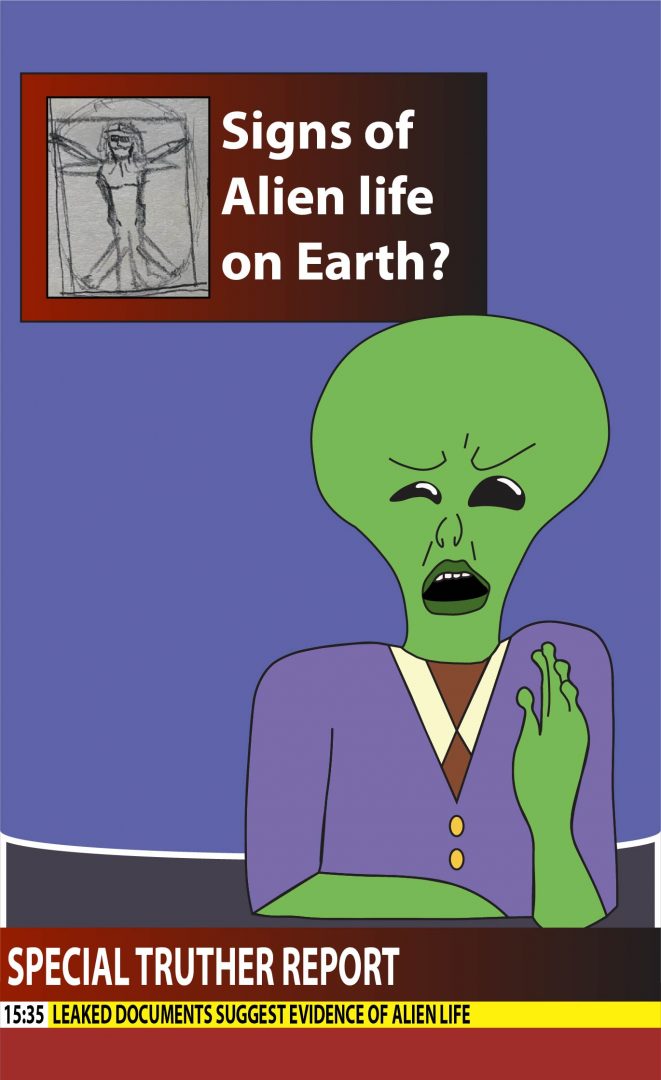From hearsay stories of paranormal activity regarding the Hannah House on Madison Ave. to the U.S. Navy-confirmed footage of “unidentified aerial phenomena,” according to CNN, it seems the development of conspiracy theories is inevitable. With that being said, it is my understanding that taking conspiracy theories too seriously is detrimental to our advancement as a society.
It is worth noting that there is a difference between something like an urban legend and a conspiracy theory. Urban legend is defined in the dictionary as “a modern story of obscure origin and with little or no supporting evidence that spreads spontaneously in varying forms and often has elements of humor, moralizing or horror.” Terms like urban legend are often lumped together with conspiracy theory.
However, according to the dictionary, a conspiracy theory is “a theory that rejects the standard explanation for an event and instead credits a covert group or organization with carrying out a secret plot.” For reference, aliens are an urban legend, but believing that one’s government is hiding knowledge of alien life is a conspiracy theory. This distinction is essential in deciding whether an unsupported belief is harmless or harmful, and to what extent.
Urban legends, generally speaking, are not harmful to any person or entity. Take for example the beliefs and sentiments surrounding the Hannah House here in Indianapolis. The house is a historic site recognized by the National Register of Historic Places which many people believe to be haunted.
According to the house’s official website, the house was a stop on the Underground Railroad in which a group of runaway slaves died in a cellar fire. From that incident forward, the house became prevalent for paranormal activity, the website goes on to claim. In actuality, according to an article from The Southside Times, no primary documentation exists connecting the house to the Underground Railroad, and the house’s “haunted” nature is mere speculation and hearsay.
This is the essence of urban legends. With enough time, enough people will hear various tales about a certain subject and come to a generalized conclusion. Even if back stories and personal accounts are inconsistent with each other, or contradict documented sources, belief will remain strong among a given population.
Whether or not the Hannah House is actually haunted, no person or group is being harmed by its existence and current marketing. The house is a testament to the harmless nature of urban legends. However, I cannot say the same for conspiracy theories.
Conspiracy theories are inherently unscientific and irrational. Any middle school science class will teach that viable theories require a hypothesis, evidence gathered through repeatable experiments and a conclusion: the scientific method. Conversely, as YouTube personality Quinton Kyle Hoover points out in his video “Paul Is Dead | A Beatle Conspiracy,” conspiracy theories begin with a pre-formed conclusion supported by any supposed evidence until proven otherwise. Conspiracy theories have no logical backing to support them by design. That said, this is not the only reason I find conspiracy theories to be problematic.
Even if a theory is seemingly benign, it can still involve harmful accusations towards a person or group. For example, according to theverge.com, YouTube personality Shane Dawson sparked controversy earlier this year for a segment in one of his conspiracy videos in which he discussed the possibility of Chuck E. Cheese’s restaurants serving half-eaten pizza to their customers.
Even though Dawson included a legal disclaimer to point out that the idea was only hypothetical, the segment still received backlash, as well as several sources, such as heavy.com, debunking the theory.
To me, the fact that an online influencer was able to promote such a brazenly false piece of information about a business, alleged or not, and still walk away from the situation with over 1.7 million likes and 36.4 million views on the video in question is highly concerning. However, I feel that Dawson’s conspiracy theory videos are admittedly tame examples of misinformation when compared to something like Alex Jones’ claims about Sandy Hook Elementary School.
According to Politifact, InfoWars host Alex Jones infamously stated that the Sandy Hook Elementary shooting was a hoax. In spite of the ongoing lawsuits he has received, such as those discussed in an article from The Associated Press, Jones’ words still ring true for many people in spite of their objective falsehood.
These accusations of hoaxes surrounding tragedies can emotionally scar and invalidate victims. Furthermore, these theories have the potential to morph public opinion with false information. For instance, hoax theories can sway voters from learning about problems. I believe the voting public should be adequately informed before they cast their ballots, and if conspiracy theories get in the way of that, then perhaps it is time that we as people stop brushing them aside as harmless.
Before we impulsively latch on to theories for their appealing nature, we need to step back and evaluate the information given to us. We must actively seek out reliable sources and reject conspiracy theories for anything beyond entertaining thoughts. Otherwise, we will be doomed to endure the consequences of our own pride.







